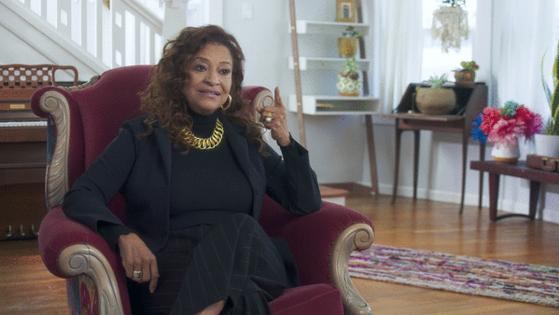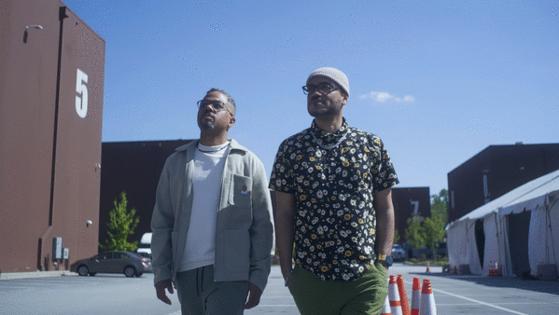Review: 'Seen & Heard' examines Black TV history, shining light on its successes and struggles
Published in Entertainment News
Issa Rae, of "Insecure" fame, is an executive producer of (and a major figure in) a new two-part documentary, "Seen & Heard: The History of Black Television," premiering this week on HBO and streaming on HBO Max. Presented as a film by Giselle Bailey, with a directed by credit shared with Phil Bertelsen, it's not a comprehensive accounting — any viewer who has watched much TV over the medium's decades might have an opinion on what's missing. But what's here is always interesting, elegantly produced, sometimes exciting, often moving. Young viewers, whose historical and cultural interests might extend no further than their own births, may have their eyes opened, but even we who remember a time before "Julia" may learn a thing or two.
The first episode, "Seen," begins with Tracee Ellis Ross and Anthony Anderson in the green room waiting to go on "Jimmy Kimmel Live!" to celebrate the end of "black-ish," after eight seasons — a Black-created, Black-run series on a major broadcast network — before jumping back to the white-written "Amos & Andy," and a halting march into a better future. Though the thrust of the combined episodes is more than hopeful — the second episode, "Heard," is a story of successes — it's also one of struggle. And in a time when powerful forces want to erase struggle from history, it's good to remember, or learn, that there was a time within the memory of people you'll meet here, when Black people barely existed in television, in front of or behind the camera.
"Heard" is essentially a series of profiles in which major industry players tell their stories. "American Fiction" director Cord Jefferson, who left journalism to write for television ("The Nightly Show With Larry Wilmore," "The Good Place," an Emmy for "Watchmen"), discusses generational trauma and talks with his father on Zoom about their anger issues (they both seem to be doing well); directors Deondray and Quincy LeNear Gossfield (working on Lena Waithe's "The Chi"), visit Quincy's family in suburban Chicago and talk about coming out after keeping their relationship secret for years. Tyler Perry gets emotional with Oprah, remembering the bad old days, and shows the filmmakers around his Atlanta studio complex, with soundstages named after Black stars, including Oprah (stage No. 1, naturally), Denzel Washington, Cicely Tyson, Whoopi Goldberg, Ruby Dee and Ossie Davis. Oprah herself recounts her journey from rural poverty to "not good" TV news reporter to talk show host. (She wasn't planning on becoming a media mogul, but she's Oprah, after all.)
Also appearing here are Debbie Allen, Shonda Rhimes, Wilmore, Waithe, Mara Brock Akil (creator of "Girlfriends" and "The Game"), Ava DuVernay, Justin Simien ("Dear White People"), trans actor Dominique Jackson ("Pose"), mogul Byron Allen, and Syreeta Singleton, promoted from a writer's assistant on the first season of "Insecure" to showrunning the next Rae project, "Rap S—." Stan Lathan went from directing Black-oriented news shows for public television to "Sanford and Son," after the show's star Redd Foxx insisted they hire Black directors and writers. ("Sanford was as honest as I could make him under the circumstances," Foxx tells Barbara Walters in a clip.) The late Norman Lear, who produced "The Jeffersons" and "Good Times" alongside "Sanford," sounds a little patronizing, or perhaps just defensive, on the subject of not using Black writers on his Black shows.
All these artists have their own styles and concerns but come together on the basic issues of diversity, visibility and control. (They're not new issues, and they're still issues.) "There's a need to see black people in a variety of roles so as to underscore the importance of a diverse and inclusive society," says USC professor Todd Boyd.
Diahann Carroll, TV's first female Black lead in "Julia," back in the late 1960s: "We're Americans, we've been here all the time. We're part of every walk of life. We should be part of the industry."
Simien: "The more specifically Black characters can live in paradoxes, the more human we are."
Esther Rolle, who left "Good Times" for a season over the emphasis on Jimmy Walker's character, J.J. "Dynomite" Evans — it also drove John Amos from the show — is seen in a contemporary interview saying, "Until there is more participation behind the scenes we're not going to be able to control what is before the camera."
It's a story about influence, about mentoring and being mentored, and torches passing. Debbie Allen remembers Akil as an intern ("She used to park my car"). Waithe, seen addressing a class of aspiring writers, named her production company for Hillman, the college in the "Cosby" spinoff, "A Different World." ("They weren't afraid to be complicated.") Rae was all about "Living Single": "I consider [Kim Coles] one of the original awkward Black girls."
Bailey handles the unavoidable question of Bill Cosby with some aplomb, covering his fall from grace after allegations of sexual assault in a couple of voice-over headlines while not discounting the importance of "The Cosby Show" (Rae: "Sometimes I thought my mom watched Claire Huxtable to learn how to parent.") or the salutary effect it had on NBC's sagging fortunes. (It's moving to see the late Malcolm Jamal-Warner, who still calls his old boss "Mr. Cosby," looking so alive here.)
The series is discursive and selective, as it would have to be, given the size of the subject; it's less about particular shows, most of which are touched on only lightly, than about cultural waves and the feast and famine cycles of Black TV. Donald Glover appears briefly in a scene from Rae's web series, "The Mis-Adventures of Awkward Black Girl," which led to "Insecure," but his own "Atlanta," one of the greatest TV series of the century, isn't mentioned. Tamera Mowry-Housley, co-star of "Sister Sister," remembers Tim Reid, who played her father on the show, telling her how new networks would use Black shows to build an audience and then abandon them in favor of white shows; but you wouldn't know, unless you already knew, that Reid co-produced and starred in one of television's great lost series, the New Orleans-set "Frank's Place" on CBS, or co-created the Showtime series "Linc's," set in a Washington, D.C., bar.
Yet it speaks in a way to the richness of the subject that some of the most interesting, which is not to say most successful, Black series of the modern era have been out of the mainstream or resist easy categorization — "The Vince Staples Show," "Black Jesus," "The Boondocks," "I'm a Virgo" — none of which fit in this narrative. I was happy, however, to see Terence Nance, whose great surrealist-operatic HBO series "Random Acts of Flyness" is describable only at length, included. "It's a colonial dynamic, larger corporations provide the money which creates a system of control," he says of the TV business. "What's valuable to me is spiritual values, cultural values, essentially [a] nonnegotiable value system inherited from ethereal realms. That will never be valuable to corporations."
Wilmore is more optimistic. "We're truly in the best time right now to create something specific that is for your point of view, that's different," he says. "Because there's so many different types of people that are opening different doors."
In the end, it's all down to quality. "My goal is to be a really good television writer," Waithe tells her class. "That was the mission. To be good at that. Nothing else mattered."
———
'SEEN & HEARD'
Rating: TV-MA
How to watch: HBO Max
———
©2025 Los Angeles Times. Visit latimes.com. Distributed by Tribune Content Agency, LLC.


















Comments